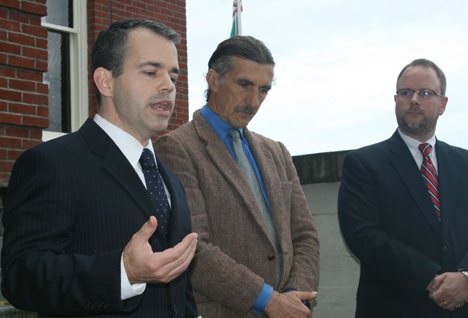Lopez Island farmer Gary Franco has sued San Juan County over its ordinance requiring some vendors to obtain a permit to sell in public places.
Franco teamed up with the Institute for Justice — an advocate for the rights of entrepreneurs — in the suit, announced today in a press conference on the courthouse steps.
The County Council approved the ordinance in July. A vendor must pay $50 for each day he or she wishes to sell, and must receive the written consent of the adjoining property owner. Franco says that’s tantamount to giving business owners the power to veto competition.
Vending without a permit incurs a penalty of $250 per hour.
“Hard-working entrepreneurs like Gary should not be threatened with thousands of dollars in fines simply because the government has given into favored businesses who want protection from competition. That is an abuse of government power,” Michael Bindas said in a press release issued before the press conference. He is a staff attorney at the Institute for Justice Washington chapter.
“Gary Franco’s right to earn an honest living is protected by the Washington Constitution. Unfortunately, government officials have decided instead to protect politically connected special interest groups.”
Franco grows some of his produce on his Madrona Farms and purchases the rest from local farmers. Most of the produce — including blueberries, raspberries and strawberries — is picked fresh the morning he sells it. His customers include local families, tourists and mom-and-pop restaurants. Franco contends that the law targets vendors whose products cost less than those in stores.
The county maintains that requiring a permit to vend is necessary to ensure public health and safety. There are exemptions: farmers who sell their own produce; vendors who do not remain in the same place for more than five minutes, such as peddlers and ice cream trucks; charitable, religious and fraternal non-profit organizations; and county-authorized events such as art fairs, farmer’s markets, fairs, and parades.
Franco and the institute say the law is discriminatory.
“Vendors like Gary pose no more of a threat to public health and safety than these favored, exempt vendors, yet they are still required to pay the government and obtain the blessing of their competitors in order to earn a living,” the institute stated in its press release.
“Economic liberty is a basic civil right that cannot be trampled on simply to benefit special interest groups,” institute Executive Director Bill Maurer said. Bindas added, “Entrepreneurs are the engine that will drive us into an economic recovery. The government needs to get out of their way and protect their rights rather than protect existing businesses from competition.”
The institute says San Juan County’s ordinance is unconstitutional. The Washington Constitution protects the right to economic liberty, “especially against the kind of protectionism at play in San Juan County,” the institute states. And state law, RCW 36.71.090, states “(1) It shall be lawful for any farmer, gardener, or other person, without license, to sell, deliver, or peddle any fruits, vegetables, berries, eggs, or any farm produce or edibles raised, gathered, produced, or manufactured by such person.”
The law states “no city or town shall pass or enforce any ordinance prohibiting the sale by or requiring license from the producers and manufacturers of farm produce and edibles as defined in this section.”
The law does state “nothing in this section authorizes any person to sell, deliver, or peddle, without license, in any city or town, any dairy product, meat, poultry, eel, fish, mollusk, or shellfish where a license is required to engage legally in such activity in such city or town.”
Bindas said the lawsuit hopes to establish constitutional precedent protecting entrepreneurs throughout Washington.
“The Institute for Justice seeks not only to vindicate Gary’s right to economic liberty but also to challenge the premise of San Juan County’s licensing regime: that government can exclude someone from a lawful occupation simply to protect favored businesses from fair competition,” Bindas said.
Institute president and general counsel Chip Mellor said, “This lawsuit is an important part of the Institute for Justice’s nationwide campaign to restore economic liberty to all Americans by defending their constitutional right to earn an honest living.”



